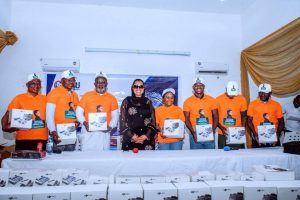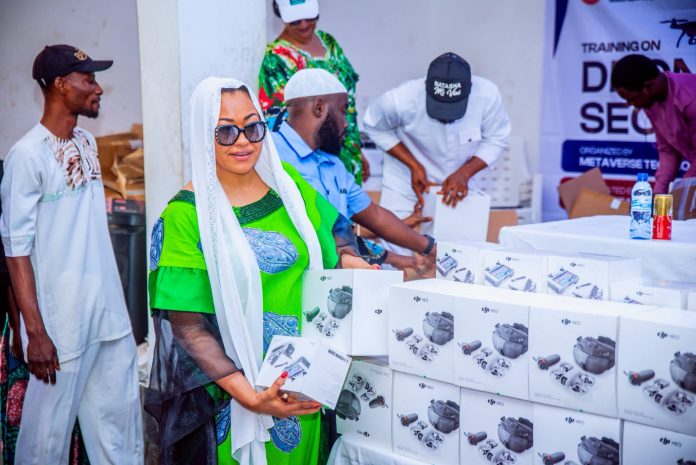
The Senate Chamber was thrown into an air of intellectual resonance and policy foresight on Thursday as Senator Natasha Hadiza Akpoti-Uduaghan, the distinguished lawmaker representing Kogi Central Senatorial District, made an impactful contribution during the screening and confirmation hearing of Professor Joash Ojo Amupitan (SAN) as the new Chairman of the Independent National Electoral Commission (INEC).
The session, which held at the National Assembly Complex, Abuja, witnessed high-level deliberations on electoral transparency, logistics innovation, and institutional reforms in Nigeria’s electoral architecture. Senator Akpoti-Uduaghan’s interventions stood out for their strategic insight, especially as they touched on the integration of technology, specifically drone usage into electoral material distribution and malpractice tracking.
It will be recalled that weeks before the screening, Senator Natasha H. Akpoti-Uduaghan had trained and empowered hundreds of Kogi Central youths with High-Tech Drones, under her Technology and Innovation Empowerment Programme, a forward-thinking initiative designed to equip young Nigerians with modern tools for surveillance, security, and logistics.
In what now appears prophetic, her emphasis on drone technology for community development, election monitoring, and emergency response has found reflection in the national discourse on electoral reforms.
During the Senate screening, Professor Joash Amupitan disclosed that under his leadership, INEC will deploy drones for the distribution of sensitive electoral materials across difficult terrains, as well as for monitoring election-day activities to combat vote manipulation and logistical failures.
“The Commission will explore the use of drone technology to address logistics bottlenecks, curb electoral fraud, and ensure real-time surveillance of polling areas,” Prof. Amupitan said in response to a question on logistics and election transparency.
Observers and political analysts have since noted the intellectual synergy between Senator Natasha’s prior advocacy and INEC’s emerging technological direction, a synergy that symbolizes how visionary leadership can shape national reforms.
Taking the floor during the session, Senator Natasha Akpoti-Uduaghan commended the nominee for his courage in acknowledging the Commission’s long-standing logistical challenges, while urging him to institutionalize technology-driven solutions that are accessible, transparent, and corruption-proof.
She questioned the nominee on how INEC plans to ensure that such high-tech innovations are not hijacked by partisan interests, emphasizing the need for equitable technological deployment across urban and rural voting centers.
“Technology without accountability can easily become a new tool for manipulation,” she cautioned. “If we must deploy drones, let them serve as instruments of transparency, not surveillance for suppression.”
Her remarks drew murmurs of approval across the red chamber, as fellow lawmakers acknowledged her courage and clarity of thought, a trademark of her legislative engagements since returning to the Senate after her unjust suspension earlier this year.
Political commentators and civil society organizations have lauded Senator Akpoti-Uduaghan’s consistent advocacy for technological modernization in governance.
A policy analyst at the Centre for Legislative Innovation, described Natasha as “a rare legislator whose foresight is already influencing institutional thinking.”
“It’s remarkable that INEC’s new chairman is proposing the same technological solutions Senator Natasha has been advocating and demonstrating at the constituency level. This shows how constituency-driven innovation can inform national reform,” she remarked.
Similarly, youth groups in Kogi Central expressed pride in their senator’s forward-looking initiatives, calling her “the voice of innovation and integrity in the Senate.”
The plan by INEC to deploy drones for logistics marks a historic turning point in Nigeria’s electoral management system. For years, the Commission has battled challenges ranging from late delivery of materials to ballot box snatching and vote buying.
By adopting unmanned aerial systems, INEC aims to ensure timely distribution of election materials in remote and riverine communities, monitor and record real-time voting activities to discourage malpractice, and track logistics efficiency while reducing dependency on manual transportation prone to human interference.
However, as Senator Natasha warned, the success of this innovation will depend on institutional integrity, data protection, and transparency of implementation.
The unfolding development at the Senate confirms what many Nigerians already know that Senator Natasha Akpoti-Uduaghan is not just a lawmaker, but a policy influencer whose ideas resonate at the highest levels of national governance.

Her contribution to the screening of Prof. Amupitan goes beyond rhetoric; it bridges the gap between grassroots innovation and federal reform, offering a model of what legislative foresight can achieve when guided by patriotism and vision.
As INEC prepares to operationalize its drone initiative, Nigerians can only hope that this new synergy between visionary legislators and reform-minded technocrats will finally usher in the transparent, technology-driven elections the nation has long awaited.
By Michael Samuel Idoko
Political Editor, Naija Reality News | Abuja Bureau
